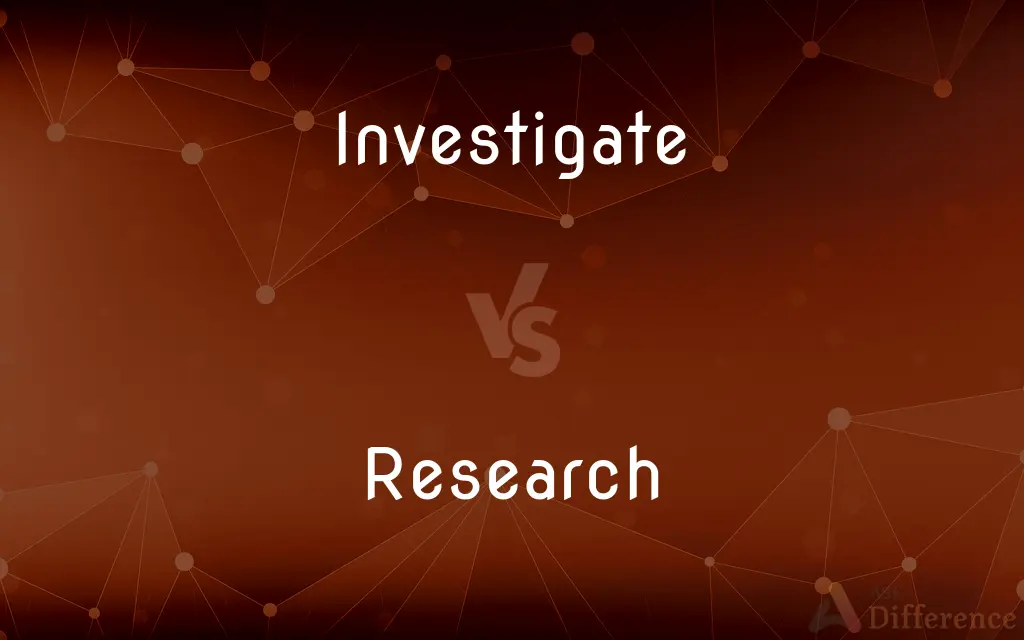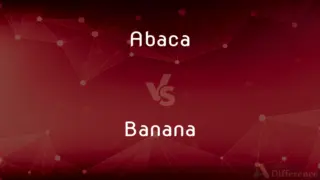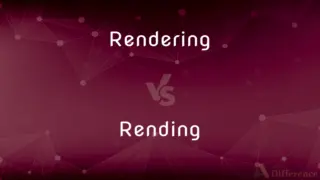Investigate vs. Research — What's the Difference?
By Tayyaba Rehman — Updated on October 24, 2023
"Investigate" means to examine a matter closely, while "research" refers to systematic study to establish facts or principles.

Difference Between Investigate and Research
Table of Contents
ADVERTISEMENT
Key Differences
"Investigate" typically connotes a thorough examination or inquiry into specific events, actions, or allegations. It's often associated with determining the truth behind a particular matter, especially in legal or crime-related contexts. In contrast, "research" is a broader term, denoting an in-depth study or examination of a subject to discover or establish facts or principles. Researchers employ various methodologies, sometimes over extended periods, to gather and analyze information.
While both "investigate" and "research" involve seeking information, their objectives often differ. Investigators aim to uncover specific details, perhaps about an incident or claim, to establish what happened and why. "Research", meanwhile, may not target a particular event but instead seeks general knowledge, understanding, or validation of theories in a subject area. This distinction makes "research" common in academic, scientific, or business contexts, where new knowledge or validation of existing knowledge is pursued.
Furthermore, tools and methodologies may vary. Investigators might rely on interviews, surveillance, or evidence collection. On the other hand, researchers could use experiments, surveys, or literature reviews. The intent behind "investigate" is often to resolve ambiguity or doubt, while "research" might aim to advance knowledge, test a hypothesis, or develop new theories.
In summary, while both "investigate" and "research" imply a quest for knowledge, "investigate" often has a more immediate and targeted focus, often revolving around specific incidents or claims. In contrast, "research" typically denotes a broader, more systematic study aimed at understanding or establishing facts or principles in a given field.
Comparison Chart
Primary Purpose
Examine specific events or actions closely.
Systematic study to establish facts or principles.
ADVERTISEMENT
Common Contexts
Legal, crime-related, or specific incidents.
Academic, scientific, or general knowledge-seeking.
Objective
Uncover specific details about an incident or claim.
Seek general knowledge, validate theories.
Methodologies
Interviews, surveillance, evidence collection.
Experiments, surveys, literature reviews.
Intent
Resolve ambiguity, establish truth behind an event.
Advance knowledge, test a hypothesis, develop theories.
Compare with Definitions
Investigate
To examine a matter closely.
The police will investigate the crime scene.
Research
The systematic study of a subject.
He conducted research on ancient civilizations.
Investigate
To explore systematically.
Scientists investigate phenomena to understand their origins.
Research
A detailed study of a single field or topic.
His research in genetics has been groundbreaking.
Investigate
To make inquiries into.
She decided to investigate the company's claims.
Research
Exploration of sources for scholarly purposes.
The author's research for the book took several years.
Investigate
To search out and examine particulars to ascertain the facts.
Journalists investigate stories to uncover the truth.
Research
Investigation or experimentation to establish facts.
Her research confirmed the initial findings.
Investigate
Carry out a systematic or formal inquiry to discover and examine the facts of (an incident, allegation, etc.) so as to establish the truth
Police are investigating a claim that the man was beaten unconscious by a gang
Research
The collecting of information about a particular subject.
She's doing research for her thesis.
Investigate
To observe or inquire into in detail; examine systematically
Investigate a crime.
Investigate ways to use less energy.
Investigate whether the virus is contagious.
Research
Research is "creative and systematic work undertaken to increase the stock of knowledge". It involves the collection, organization, and analysis of information to increase understanding of a topic or issue.
Investigate
To make a detailed inquiry or systematic examination.
Research
The systematic investigation into and study of materials and sources in order to establish facts and reach new conclusions
He prefaces his study with a useful summary of his own researches
Medical research
The group carries out research in geochemistry
Investigate
(transitive) To inquire into or study in order to ascertain facts or information.
To investigate the causes of natural phenomena
Research
Investigate systematically
The team have been researching into flora and fauna
She has spent the last five years researching her people's history
Investigate
(transitive) To examine, look into, or scrutinize in order to discover something hidden or secret.
To investigate an unsolved murder
Research
Careful study of a given subject, field, or problem, undertaken to discover facts or principles.
Investigate
(intransitive) To conduct an inquiry or examination.
Research
An act or period of such study
Her researches of medieval parish records.
Investigate
To follow up step by step by patient inquiry or observation; to trace or track mentally; to search into; to inquire and examine into with care and accuracy; to find out by careful inquisition; as, to investigate the causes of natural phenomena.
Research
To engage in or perform research.
Investigate
To pursue a course of investigation and study; to make investigation.
Research
To study (something) thoroughly so as to present in a detailed, accurate manner
Researching the effects of acid rain.
Investigate
Investigate scientifically;
Let's investigate the syntax of Chinese
Research
To do research for
Research a magazine article.
Investigate
Conduct an inquiry or investigation of;
The district attorney's office investigated reports of possible irregularities
Inquire into the disappearance of the rich old lady
Research
Diligent inquiry or examination to seek or revise facts, principles, theories, applications, etc.; laborious or continued search after truth.
The research station that houses Wang and his team is outside Lijiang, a city of about 1.2 million people. File:The research station that houses Wang and his team is outside Lijiang.ogg
Investigate
To subject to an official probe or inquiry.
The committee will investigate the allegations.
Research
A particular instance or piece of research.
Research
(transitive) To search or examine with continued care; to seek diligently.
Research
(intransitive) To make an extensive investigation into.
Research
(transitive) To search again.
Research
Diligent inquiry or examination in seeking facts or principles; laborious or continued search after truth; as, researches of human wisdom; to research a topic in the library; medical research.
The dearest interests of parties have frequently been staked on the results of the researches of antiquaries.
Research
Systematic observation of phenomena for the purpose of learning new facts or testing the application of theories to known facts; - also called scientific research. This is the research part of the phrase "research and development" (R&D).
Research
To search or examine with continued care; to seek diligently.
Research
Systematic investigation to establish facts
Research
A search for knowledge;
Their pottery deserves more research than it has received
Research
Inquire into
Research
Attempt to find out in a systematically and scientific manner;
The student researched the history of that word
Common Curiosities
Can "research" be done on a single topic?
Yes, research can be a detailed study of a single topic or subject.
Is "research" always scientific?
No, research can be conducted in various fields, not just scientific ones.
Can a student "investigate" a topic for a project?
Yes, a student can "investigate" specific aspects of a topic, though they might also "research" it broadly.
If I'm looking into a company's history, am I investigating or researching?
Both can apply, but you're likely "researching" if seeking general knowledge, and "investigating" if delving into specific events.
Does "investigate" always relate to crime?
No, while often used in legal or crime contexts, "investigate" simply means examining a matter closely.
Do researchers always reach a conclusion?
Not always. Research might also raise new questions or hypotheses.
Is an "investigation" always reactive?
Not always. Some investigations, like audits, can be proactive.
Are all investigations formal?
No, investigations can be formal or informal depending on the context.
Can one "investigate" a rumor?
Yes, investigating a rumor means looking into its validity or origin.
Can you "research" a person?
Yes, researching a person might involve studying their life, work, or impact.
Do investigations always lead to discoveries?
Not always. Some investigations might not yield new information.
Is all research published?
No, some research might not be published due to various reasons like inconclusiveness or sensitivity.
Is every investigation research?
Not necessarily. While both seek information, their methodologies and purposes might differ.
Are investigative journalists also researchers?
Yes, investigative journalists both "investigate" specific claims and "research" topics to provide context.
Can "research" be subjective?
While research aims for objectivity, it can sometimes be influenced by the researcher's biases.
Share Your Discovery

Previous Comparison
Abaca vs. Banana
Next Comparison
Rendering vs. RendingAuthor Spotlight
Written by
Tayyaba RehmanTayyaba Rehman is a distinguished writer, currently serving as a primary contributor to askdifference.com. As a researcher in semantics and etymology, Tayyaba's passion for the complexity of languages and their distinctions has found a perfect home on the platform. Tayyaba delves into the intricacies of language, distinguishing between commonly confused words and phrases, thereby providing clarity for readers worldwide.













































